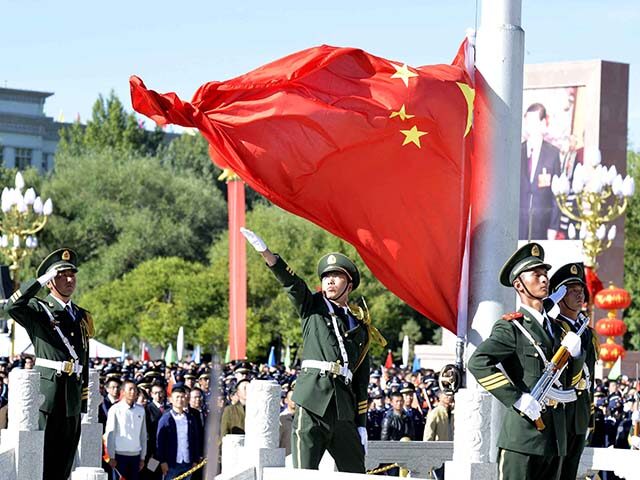China’s rubber-stamp legislature on Wednesday passed a “Foreign Relations Law” intended to enhance “extraterritorial application” of Communist law — in other words, force people in other countries to obey it, or at least fear it — and protect the regime in Beijing from foreign sanctions.
China’s state-run Global Times babbled about “fixing loopholes in the rule of law” and protecting the regime from “frequent external interference in its internal affairs,” but eventually got to the point and said the Foreign Relations Law would provide “a legal basis for the diplomatic struggle against sanctions.”
Not much in the law is really new — it most codifies some measures dictator Xi Jinping already put in place, tightens his grip on foreign relations, and effectively automates tit-for-tat retaliation against foreign sanctions.
“Some legal experts said that the law inherited China’s long-term diplomatic stance and its position on international rule of law, upgrading policies and systems for foreign affairs management to national law, legally interpreting and elaborating on a series of new ideas and initiatives in global governance. With the implementation of the law and the introduction of more legislation on foreign affairs in the future, China’s ability to defend its interests and people through legislations will be continuously improved,” the Global Times bloviated.
The closest the Chinese Communist paper got to explaining what the Foreign Relations Law actually does was a passage that complained about U.S. sanctions against China’s espionage activities and human rights abuses:
The law stipulates that the goal of developing foreign relations includes developing a global partnership and promoting an all-round, multi-level, wide-ranging and three-dimensional external work layout, promoting the coordination and positive interaction among major countries.
The US is the only sanctions superpower in the world. According to the Treasury 2021 Sanctions Review by fiscal year 2021, the number of active US sanctions designations had increased to more than 9,400, according to a report released by the Chinese Foreign Ministry in February on US’ long-arm jurisdiction. In recent years, China has been subjected to mounting US sanctions over a series of matters such as high-tech, Xinjiang and Hong Kong as well as the Ukraine crisis.
China’s senior diplomat Wang Yi was more concise on Thursday, stating that the Foreign Relations Law is intended to serve as a “deterrent” against sanctions.
Wang said Beijing will “make full use of the Foreign Relations Law as a legal tool – through legislative, law enforcement, judicial and other means – to carry out our fight in response to acts of containment, interference, sanctions and destruction.”
In other words, the vast bureaucracy of the Chinese tyranny will get to work crafting all sorts of retaliatory measures and setting them up to detonate automatically, as soon as other countries impose sanctions against China for using forced labor or stealing their intellectual property. Wang and his diplomatic corps can shrug and say these retaliations are happening automatically, so attempting to argue China out of imposing them would be pointless.
The Financial Times (FT) on Thursday wondered if Beijing picked a bad time to launch its long-threatened system of automatic sanctions retaliation, since China’s economy is flagging, and the regime has been struggling to keep foreign investors from fleeing after years of lockdowns and industry crackdowns.
“If the Chinese economy remains weak, then Beijing will lack the requisite power to underpin its power projection. There is always this contradiction,” Jamestown Foundation senior fellow Willy Lam told FT.
Bloomberg News quoted Josef Korbel School of International Studies professor Suisheng Zhao describing the Foreign Relations Law as “the personalization of Chinese foreign policy through a legal process,” sending a signal to both foreign leaders and Chinese businessmen that Xi and the Communist Party are firmly in control of foreign policy.
The personalization aspect comes from the new law incorporating the Global Security Initiative and Global Civilization Initiative, two of Xi Jinping’s major foreign policy initiatives. This puts Xi’s fingerprints all over the legislation, and perhaps signals that Beijing is ready to get much more serious about retaliatory actions.
Bloomberg noted that Xi has “struggled for years to find a response to U.S. sanctions, tariffs and export controls that makes China look tough without scaring off foreign companies.” Xi’s retaliation for American sanctions frequently targeted high-profile companies and individuals that don’t actually have “significant business in China” – up until China banned the import of Micron Technology chips last month.
One significant measure that is not included in the Foreign Relations Law was a long-threatened anti-sanctions law for Hong Kong, which could potentially allow China to seize assets from the many foreign companies that do business in Hong Kong if their national governments imposed sanctions on China. Hong Kong officials are very nervous about China imposing such a law, as it might prompt billions of dollars in foreign money to flee for safer havens.

COMMENTS
Please let us know if you're having issues with commenting.